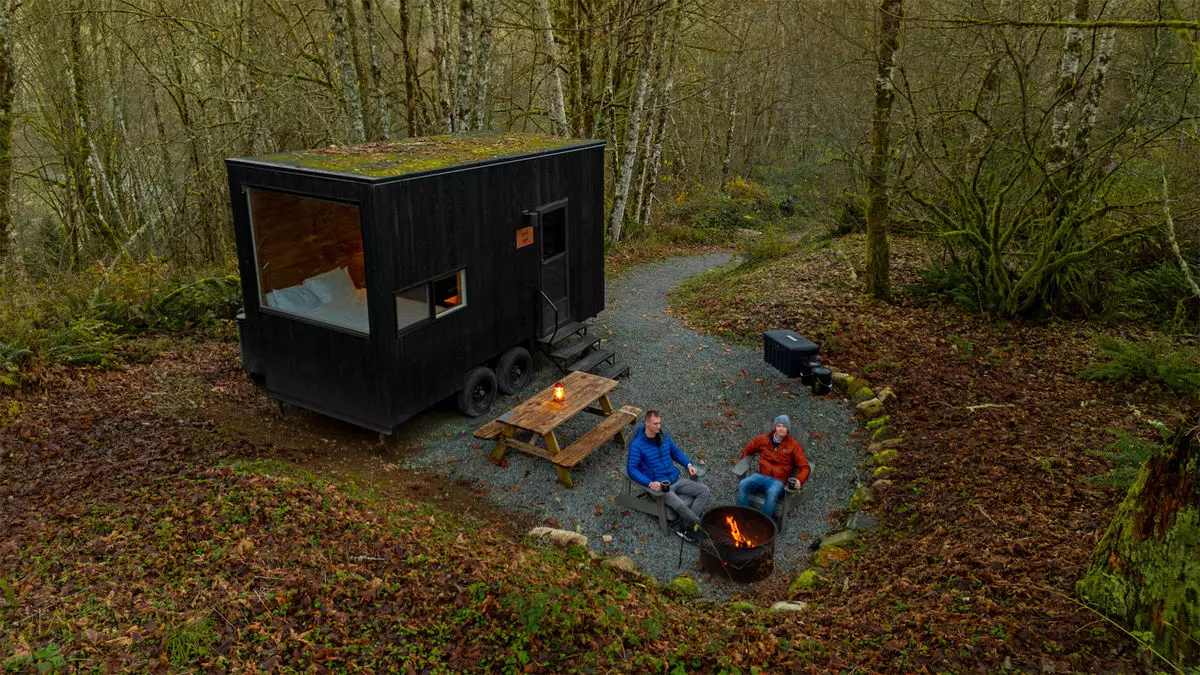The hospitality industry is experiencing a seismic shift as major players venture into the burgeoning outdoor accommodation market. Leading hotel chains like Marriott International are stepping onto this new frontier, aiming to cater to a growing demographic of travelers who seek immersive experiences in nature. Last month, Marriott made headlines by acquiring Postcard Cabins, a unique lodging concept that specializes in “tiny cabins” strategically placed within accessible distances from major urban centers. This strategic move, coupled with a partnership with the outdoors-oriented boutique hotel brand Trailborn, signals a clear intention to position itself within the nature tourism sector.
Founded in 2015, Postcard Cabins offers an innovative take on outdoor lodging, featuring cozy cabins situated in picturesque landscapes across the U.S., including popular locations like the Catskills and Shenandoah Valley. The idea is simple yet enticing: provide travelers with a rustic retreat that feels remote while being conveniently located for quick escapes from the city. Meanwhile, Trailborn, which launched recently, is designed to appeal to adventure-seekers, with properties located near renowned national parks like Rocky Mountain and Grand Canyon. Both initiatives illustrate Marriott’s commitment to tapping into the growing demand for nature-based travel.
Marriott’s strategic entry into the outdoor accommodations market isn’t an isolated case. Other hotel giants like Hyatt and Hilton are also expanding their portfolios with outdoor-centric offerings. Hyatt’s recent integration with glamping brand Under Canvas, which includes 13 outdoor resorts, highlights the rising trend of upscale “glamping” experiences. Similarly, Hilton’s partnership with AutoCamp allows travelers to experience luxury accommodations in Airstream trailers and tents, making outdoor experiences more approachable and appealing.
The influx of these major brands signifies a larger trend in hospitality: a shift toward wellness and experiential travel. As more visitors prioritize experiences that allow them to connect with nature, the hospitality sector is keen to adapt. Heather Dietrick, Chief Media Officer of Outside Interactive, points out that more hotel brands are beginning to recognize this segment, indicating that the future will see an influx of properties focused on outdoor experiences.
The expanding definition of outdoor adventure travel is a key focal point of this evolution. Shannon Stowell, CEO of the Adventure Travel Trade Association (ATTA), emphasizes that traditional ideas of adventure—often linked to extreme experiences—are evolving. This transformation sees activities such as culinary tourism, cultural enrichment, and “soft adventure” (gentler activities suitable for a broader range of people) gaining popularity. Families and older travelers are now seeking experiences that balance comfort with adventure, such as a picturesque hike followed by a wine tasting, showcasing a newfound flexibility in what constitutes an adventure.
Travel companies like Pelorus have also recognized this shift and are diversifying their offerings accordingly. While Pelorus traditionally catered to extreme adventure seekers, co-founder Geordie Mackay-Lewis points out that they’ve begun to offer more family-friendly and accessible adventures. This includes bespoke itineraries that cater to multigenerational families, elegantly intertwining luxury accommodations with activities that suit everyone in the group—be it dogsledding, snowmobiling, or immersive culinary experiences.
As luxury and comfort become increasingly necessary for today’s travelers, numerous hospitality brands aim to create an atmosphere that allows guests to enjoy nature without the burdens of extensive planning or the need for outdoor gear. Dietrick reinforces this sentiment, noting that the market is accommodating a demographic that desires a seamless blend of luxury and nature, providing all necessary comforts while enabling quality outdoor experiences.
In a climate where outdoor experiences reign supreme, preferences among travelers are undeniably shifting. According to David Kolner of Virtuoso, a significant number of their clients are now chasing experiences designed to elicit awe and wonder from the natural world. Increasingly, travelers seek personal growth and rejuvenation through adventure, reflecting a more profound shift in priorities. The notion that adventure travel must always involve exhilarating risks is being replaced with the understanding that adventure can also be synonymous with exploration, enlightenment, and luxury.
The landscaping of outdoor hospitality is undergoing substantial change. As brands like Marriott, Hyatt, and Hilton see increasing interest in nature-focused travel, they are crafting accommodations to bridge the gap between rugged outdoor experiences and upscale comfort. This evolution has the potential to grow into a robust sector, accommodating varied traveler expectations and crafting memorable, immersive experiences that resonate deeply. The future of hospitality undoubtedly lies in the hands of those who can integrate the best of both worlds—adventure with luxury, exploration with relaxation.

